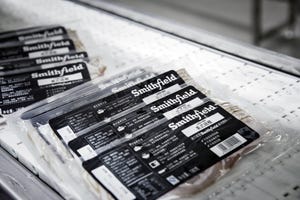June 20, 2011

The House of Representatives passed its fiscal year 2012 agriculture appropriations bill, which would limit USDA’s ability to finish the proposed Grain Inspection and Packers and Stockyards Administration (GIPSA) rule on livestock and poultry marketing. The legislation would not allow any funds made available under the bill to be used to “write, prepare, develop or publish” a final rule or an interim final rule regarding USDA’s proposed GIPSA rule on livestock and poultry marketing. This in essence stops any work on the proposed rule during fiscal year 2012, which begins Oct. 1. The National Pork Producers Council (NPPC) said it is “grateful that the House of Representatives is requiring USDA to take a timeout on the GIPSA rule, which, as proposed, is bad for farmers and ranchers, bad for consumers, and bad for rural America. And contrary to the proclamations from some general farm groups, the vast majority of livestock and poultry producers strongly oppose this regulation, which would cost them millions of dollars and lead to thousands of lost jobs.” The producer groups opposed to the proposed rule cite the negative impact it would have on producers. According to a study conducted by Informa Economics, the GIPSA rule would impose on the livestock and poultry industries “ongoing and indirect” costs – eventually borne by producers and consumers – of more than $1.64 billion, including nearly $880 million to the beef industry, more than $400 million to the pork industry and almost $362 million to the poultry industry. The American Farm Bureau Federation, National Farmers Union and R-CALF opposed the provision delaying the proposed rule.
GIPSA Rule Impact on Small Business – The Chairman of the House Small Business Committee, Congressman Sam Graves (R-MO), and Chairman of the Agriculture, Energy and Trade Subcommittee, Congressman Scott Tipton (R-CO), sent a letter to Secretary of Agriculture Tom Vilsack asking USDA to comply with the Regulatory Flexibility Act (RFA) in regards to the proposed GIPSA rule on livestock marketing practices. The members stated in the letter that GIPSA failed to properly assess the impacts of the proposed rule on small businesses in the beef, pork and poultry industries as required by RFA. The members said, the proposed GIPSA rule, “if adopted unchanged, will alter how beef, pork and poultry industries conduct their business in a manner detrimental to the thousands of small businesses involved in those industries.” Congressman Graves said, “At a time when our economy is struggling to make a recovery, all facets and outcomes must be examined – especially when it involves our best job creators. The proposed rule would be extremely damaging to small farms, kill jobs, and hamper competition across the country. Small farmers, just like other small businesses, are already under the constant threat of higher taxes and more regulations from the Obama administration. The last thing family farms need is another costly requirement that they are forced to comply with. We will continue to hold USDA accountable and ensure they follow the RFA as this process moves forward.”
House Passes Agriculture Appropriations - The House of Representatives passed its fiscal year (FY) 2012 agriculture appropriations bill on a party line vote. The bill reduces discretionary spending to the lowest level since fiscal year 2008. Discretionary spending was cut 13.6% from FY ’11 levels to $17.25 billion. A major concern for the administration is the reduction of the Food & Drug Administration’s (FDA) budget by almost 12%. The administration opposed this limitation saying it hinders FDA’s ability to implement the new food safety law. During consideration of the bill, a number of amendments were defeated that would have further reduced spending or eliminated agencies within USDA, including efforts to eliminate the Market Access Program (MAP) and eliminate USDA’s Foreign Agriculture Service. The Senate hopes to begin work on its appropriations bill later this summer.
Senate Ends Ethanol Support – In a vote of 73-27, the Senate dealt a major defeat to the ethanol industry by passing Senators Feinstein’s (D-CA) and Coburn’s (R-OK) amendment that ends the ethanol support programs on July 1. The legislation would end the 45 cents/gal. Volumetric Ethanol Excise Tax Credit (VEETC), commonly called the blender’s tax credit, and the 54-cent tariff on imported ethanol. Secretary of Agriculture Tom Vilsack said, “We need reforms and a smarter biofuels program, but simply cutting off support for the industry isn’t the right approach. Therefore, we oppose a straight repeal of the Volumetric Ethanol Excise Tax Credit (VEETC) and efforts to block biofuels infrastructure programs.” The American Meat Institute, which supports repeal, commented: “At a time of record federal deficits coupled with rising food prices, it is time to end the 30-plus years of taxpayer subsidies afforded to the corn-based ethanol industry, which is costing taxpayers approximately $6 billion this year alone.” The National Corn Growers Association said, “Today the Senate voted against rural America and domestic, renewable energy and in favor of more foreign oil. Sen. Feinstein has unfairly hit at the heart of an important agricultural industry while remaining unified with subsidy-laden Big Oil.” The Senate defeated an attempt by Senator John McCain (R-AZ) to bar the use of funds for ethanol blender pumps and storage facilities by a vote of 41-59. The House of Representatives passed an amendment to the agriculture appropriations bill that would bar funds for blender pumps and storage facilities.
P. Scott Shearer
Vice President
Bockorny Group
Washington, D.C.
You May Also Like


